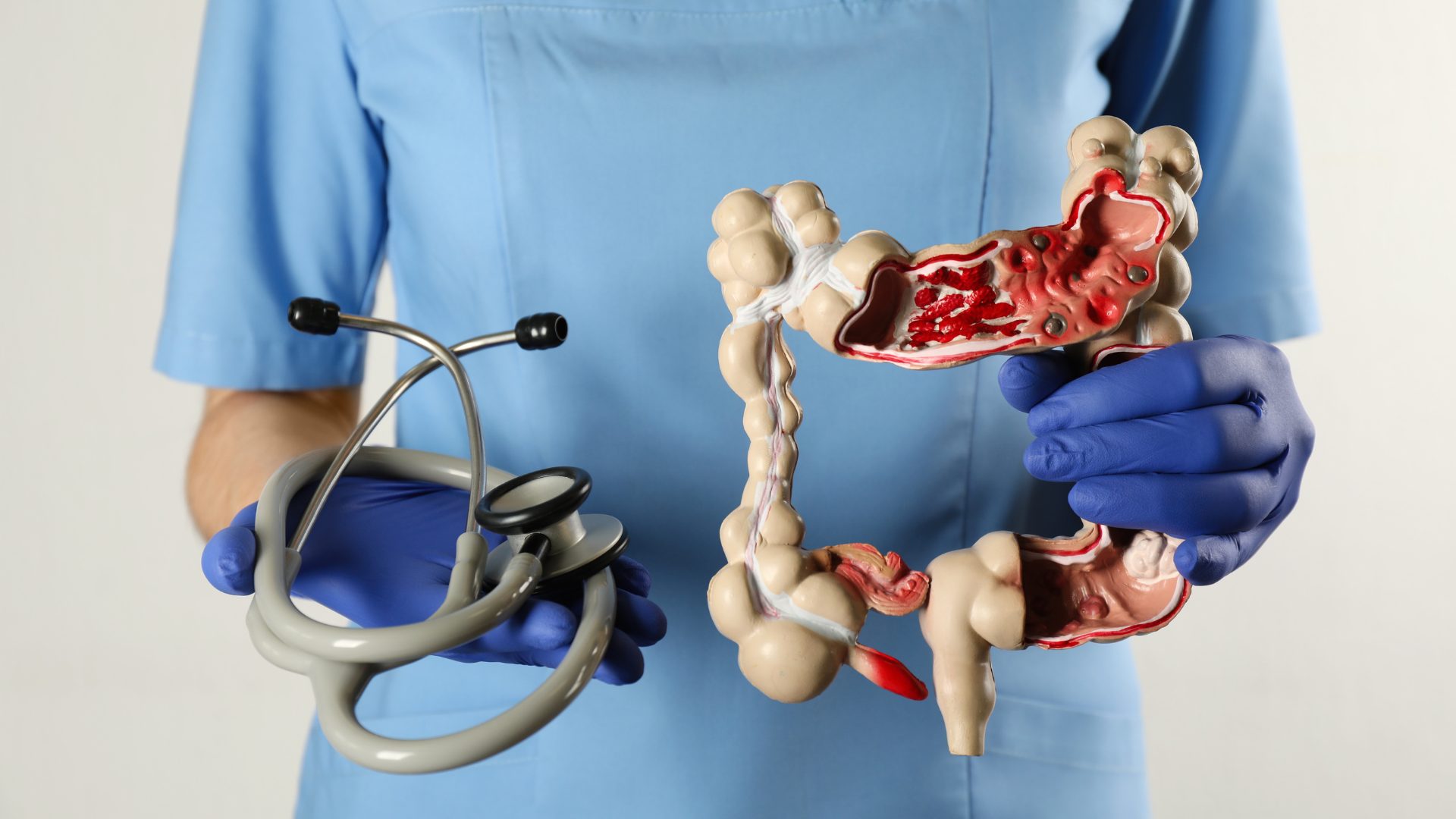El cáncer colorrectal es una de las principales causas de morbilidad y mortalidad a nivel mundial.
En América Latina, la incidencia y mortalidad por cáncer colorrectal han ido en aumento. Sin embargo, la implementación de programas de detección temprana y concienciación pública aún enfrenta desafíos en la región.
Según la Organización Mundial de la Salud (OMS), en 2020 se registraron más de 1,9 millones de casos nuevos y aproximadamente 930,000 muertes relacionadas con esta enfermedad. En la Región de las Américas, es el tercer cáncer más común, con alrededor de 246,000 nuevos casos y 112,000 muertes anuales.
¿Qué es el cáncer colorrectal?
El cáncer colorrectal se origina en el colon o el recto, partes del intestino grueso. Generalmente, comienza como un crecimiento anómalo de tejido llamado pólipo, que puede transformarse en canceroso con el tiempo. Estos pólipos suelen ser asintomáticos en sus etapas iniciales, lo que subraya la importancia de la detección temprana.

Importancia de la detección temprana
La detección precoz del cáncer colorrectal es fundamental para mejorar las tasas de supervivencia. Las pruebas de detección periódicas pueden identificar pólipos antes de que se conviertan en cancerosos, permitiendo su extirpación y previniendo el desarrollo del cáncer. Además, si se detecta en una etapa temprana, el tratamiento es más efectivo y menos invasivo.
Métodos de detección
Existen varias pruebas para la detección del cáncer colorrectal:
- Prueba de sangre oculta en heces (PSOH): Detecta pequeñas cantidades de sangre en las heces, indicativas de pólipos o cáncer. Es sencilla y no invasiva.
- Colonoscopia: Examina directamente el interior del colon y el recto, permitiendo la identificación y eliminación de pólipos durante el procedimiento.
Factores de riesgo
Varios factores pueden aumentar el riesgo de desarrollar cáncer colorrectal:
- Edad: Personas mayores de 45 años.
- Antecedentes familiares: Historia de cáncer colorrectal o pólipos en familiares cercanos.
- Dieta: Consumo elevado de carnes rojas y procesadas, y baja ingesta de frutas, verduras y granos integrales.
- Sedentarismo: Falta de actividad física regular.
- Obesidad: Exceso de peso corporal.
- Consumo de alcohol y tabaco: Uso excesivo de estas sustancias.
Pólipos: Precursores silenciosos del cáncer colorrectal
Los pólipos colorrectales son pequeñas masas de tejido que crecen en el revestimiento interno del colon o del recto. Aunque muchas veces pasan desapercibidos, su presencia representa un factor de riesgo significativo en el desarrollo del cáncer colorrectal. La mayoría de los pólipos son benignos al inicio, pero algunos tienen el potencial de convertirse en lesiones malignas si no se detectan y eliminan a tiempo.
Tipos de pólipos
Existen varios tipos de pólipos, pero dos categorías principales determinan su potencial de malignidad:
- Pólipos hiperplásicos: Por lo general, son pequeños y tienen bajo riesgo de convertirse en cáncer. Se encuentran con mayor frecuencia en el recto y el colon sigmoide.
- Adenomas (pólipos adenomatosos): Representan aproximadamente el 70% de todos los pólipos y son considerados precancerosos. No todos los adenomas progresan a cáncer, pero la mayoría de los cánceres colorrectales se originan en este tipo de pólipo.
¿Cómo se forman los pólipos?
Los pólipos suelen desarrollarse a lo largo de años, como resultado de mutaciones genéticas acumuladas en las células del epitelio intestinal. Estos cambios celulares pueden ser espontáneos o estar influenciados por factores de riesgo como la edad, los antecedentes familiares, una dieta rica en grasas y pobre en fibra, el tabaquismo o el sedentarismo.
En algunos casos, los pólipos aparecen en el contexto de síndromes genéticos hereditarios, como la poliposis adenomatosa familiar (PAF) o el síndrome de Lynch, que incrementan de manera significativa el riesgo de cáncer colorrectal a edades tempranas.
Uno de los aspectos más peligrosos de los pólipos es que, en la mayoría de los casos, no causan síntomas. Rara vez pueden producir sangrado rectal, cambios en el hábito intestinal o dolor abdominal, y estos signos suelen aparecer cuando el crecimiento es considerable o ya ha progresado a una lesión maligna.
Por eso, la única manera fiable de detectarlos a tiempo es a través de pruebas de cribado como la colonoscopia.
Colonoscopia: diagnóstico y tratamiento en un solo paso
Le puede interesar: Todo sobre la ColonoscopiaLa colonoscopia no solo permite visualizar el interior del colon y detectar pólipos, sino que también ofrece la posibilidad de extirparlos durante el procedimiento. Este enfoque preventivo tiene una eficacia extraordinaria. Diversos estudios han demostrado que la resección de pólipos puede reducir el riesgo de cáncer colorrectal en más del 60%.
Además, una colonoscopia completa puede establecer un seguimiento personalizado en función del número, tamaño y tipo de pólipos encontrados, lo cual es esencial para vigilar la posible recurrencia o aparición de nuevos pólipos.
¿Cada cuánto debería hacerse una colonoscopia?
Las guías internacionales recomiendan que las personas con riesgo promedio comiencen las pruebas de detección a partir de los 45 años. Sin embargo, quienes tengan antecedentes familiares de pólipos o cáncer colorrectal, o factores de riesgo adicionales, deben iniciar el cribado antes, según recomendación médica.
Si durante una colonoscopia se encuentran pólipos adenomatosos, la frecuencia de las pruebas posteriores dependerá de las características del pólipo: tamaño, número y hallazgos histológicos.
Educar a la población sobre los pólipos como precursores del cáncer es fundamental. Muchas personas no conocen la existencia de estos crecimientos ni su potencial para evolucionar hacia una enfermedad maligna. Comprender que un pólipo hoy puede ser un cáncer mañana —y que existe una ventana de años para detectarlo— es una herramienta poderosa de prevención.
¿Cómo podemos prevenir el cáncer colorrectal?
Adoptar hábitos saludables puede reducir significativamente el riesgo de cáncer colorrectal:
- Dieta balanceada: Incrementar el consumo de fibra, frutas y verduras, y reducir la ingesta de carnes procesadas.
- Actividad física: Realizar ejercicio moderado a intenso de forma regular.
- Control de peso: Mantener un peso saludable.
- Evitar el tabaco y el alcohol: Reducir o eliminar su consumo.
Estas medidas, combinadas con pruebas de detección periódicas, son esenciales para la prevención efectiva del cáncer colorrectal.

Panamá Cancer Clinic: Su aliado en la prevención y tratamiento
En Panamá Cancer Clinic, entendemos la importancia de la detección temprana y el tratamiento oportuno del cáncer colorrectal. Nuestro equipo de especialistas ofrece:
- Evaluaciones personalizadas: Análisis de factores de riesgo individuales y recomendaciones específicas.
- Pruebas de detección avanzadas: Acceso a colonoscopias y pruebas de sangre oculta en heces con tecnología de vanguardia.
- Tratamientos integrales: Opciones terapéuticas adaptadas a las necesidades de cada paciente.
- Acompañamiento continuo: Apoyo emocional y seguimiento durante todo el proceso.
Detectar el cáncer colorrectal a tiempo puede salvar su vida. Le invitamos a programar una consulta con nuestros especialistas y dar el primer paso hacia una salud óptima. Su bienestar es nuestra prioridad.






